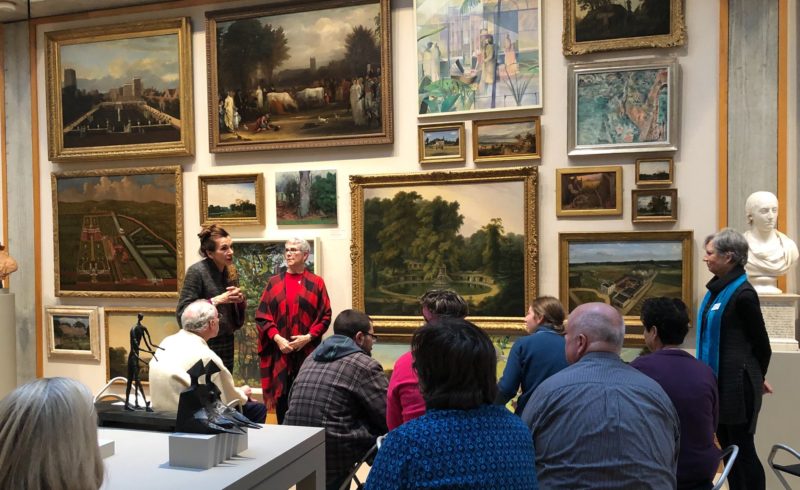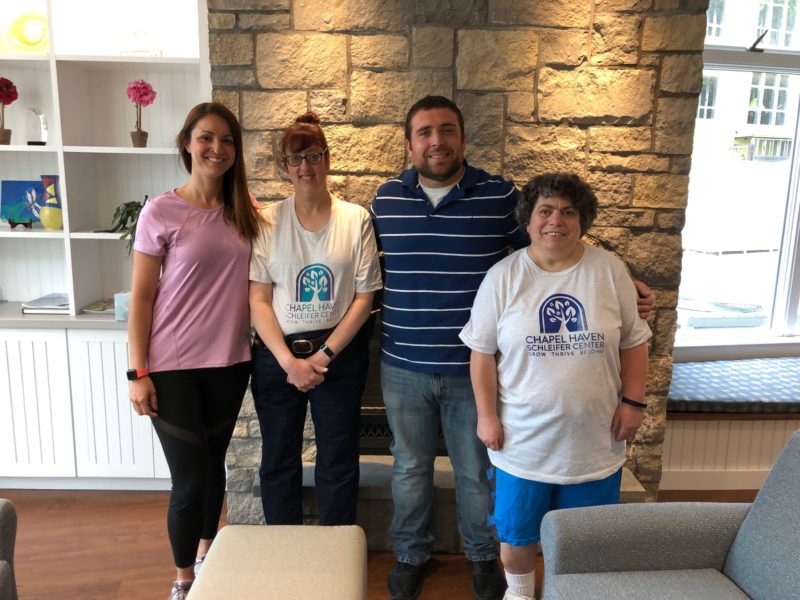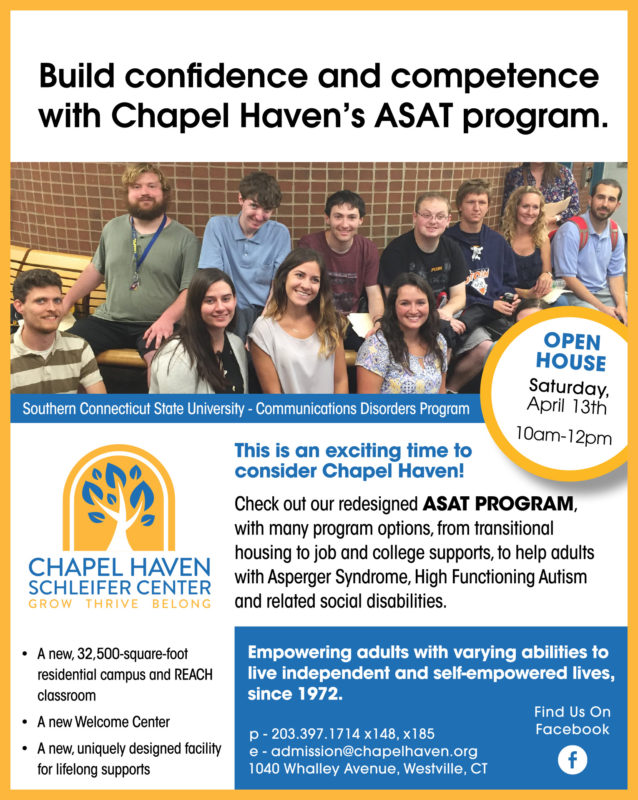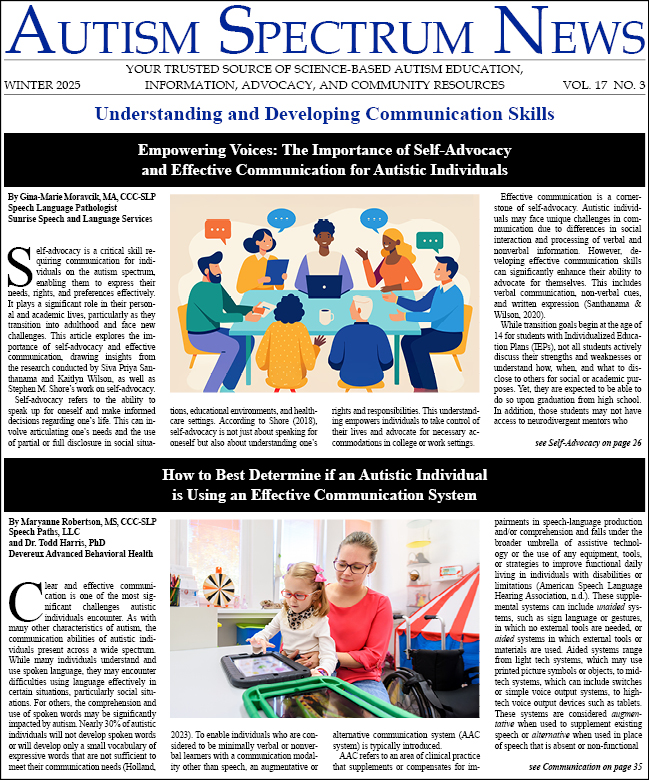Andrew Auerbach, 63, has been going on weekend recreation trips with Chapel Haven Schleifer Center in New Haven, CT, since he arrived at the recreation program for adults with disabilities in 1977. Andy, who grew up on the Upper West Side of NYC, holds two part-time jobs during the week, so the weekend is prime time for relaxing and having fun. Some of his favorite weekend trips include Mystic Seaport, the Bronx Zoo, the Essex Steam Train and the Big E.

Chapel Haven’s “Out to Art” class at the Yale Center for British Art
“I get a lot of benefits out of these trips,” he said. “I get mostly pleasure and social connectivity too.”
Like many agencies that provide a recreation program for adults with disabilities, Chapel Haven puts great emphasis on offering its adults, whose ages range from 18 to 66, lots of opportunities to socialize. From in-house activities like Karaoke Night and Bingo, to the mall, sports and activity trips across the tristate area, the weekend calendar offers everybody the chance to get together, blow off steam, have fun and learn to manage leisure time.
They can also compete in sports through Special Olympics, sign up for classes that will bring them off campus and even get together to cook or work out.
Having a robust social calendar is important for all people, but there is an art to offering a meaningful experience at recreation programs for adults with disabilities.
“Recreation and leisure activities are a critical dimension of the quality of life for all people, including those with developmental disabilities,” according to Syracuse University’s National Resource Center on Supported Living and Choice Center on Human Policy. “They are a vehicle through which people have fun, meet new friends, and develop skills and competencies.
So, what are the elements that make a program successful?
One consideration is not just sending adults in one big group to a public place but offering them the chance to mingle and build relationships with the people in the communities they visit.
“Our clients benefit greatly when they go into the community. Not only do recreation trips in the community promote inclusion but they also help our clients build their confidence through social interactions and new experiences. Recreation is an important component of maintaining a healthy lifestyle,” says Emily Westman, director of recreation at Chapel Haven Schleifer Center.
Another important component of a good leisure program is lessening the intimidation factor of entering places such as museums. That is one of the goals that Chapel Haven’s Art Director, Tina Menchetti, had in mind when she worked with the Yale Center for British Art on a program called “Out to Art.” Menchetti chaperones students to the museum for a wide range of activities.
“I sometimes wonder who gets more out of the program – our special visitors or the museum staff,” said Linda Friedlaender, Senior Curator of Education at the Yale Center for British Art. “Weekly visits have strengthened social, emotional, and cognitive growth by providing spaces filled with new friends who work at the Center and art objects which are used in many ways. Students have fun exploring the galleries using costumes, mirrors, masks, instruments, music, and iPads. They learn about history, royalty, politics, literature, sports, and the processes and materials used in making what they are looking at.”

Andrew Auerbach, a Chapel Haven community member, enjoys classes and weekend rec activities, including a class in painting glassware
“Traveling beyond the boundaries of the campus of the Chapel Haven Scheifer Center has broadened their world and provided confidence for many to continue these explorations,” Friedlaender noted. “A few students have learned to take public transportation to the museum, and some even come on their own just to look around or attend a public lecture.”
Over time, Chapel Haven and the Yale Center have presented at national conferences on this unique partnership and have identified five common elements that make the program a success for the special needs population.
First, and most important, is that all staff are engaged. The museum spends a lot of time training its own staff, so that when an individual steps through the front door, they feel welcomed.
“When teachers, security and information volunteers greet students by name as soon as they enter the museum, students feel that they are welcome,” reported Lynne Horoschak, a professor at Moore College of Art and Design.
Second, the instruction is differentiated. “Sound and movement activities give all students the chance to respond, even if they struggle verbally,” she reports. “Students are treated like adults, but lessons are no-fail and geared to a range of cognitive abilities.”
All lessons have multi-sensory elements and each class includes hands-on studio activities. Students may sit in on a lecture about Constable or Turner and then will have the chance to make some art in response to what they’ve heard and seen.
The end result, according to Menchetti, is visible in the students. “Their posture is stronger, their heads are held high. They have really risen to the occasion of being in a world-class museum,” she noted.
Eric Chessen, founder of Autism Fitness, is a believer in recreation activities that build physical fitness and wellness. He blends in repetition, social stories and a menu of choices.
“Regular, vigorous, progressive physical activity should be a staple in any educational, recreational, and vocational program,” he said. “For both proactive and reactive health and psychological/emotional benefits, exercise and being outdoors should not be a privilege but a cornerstone of life skills.”
Chapel Haven community member Ellen Rosenbaum is a big believer in fitness. She recently placed second in the agency’s Biggest Loser competition, which drew 43 participants. She lost a total of 35 pounds during the campaign.

Biggest Loser 2019: Ellen Rosenbaum, at far right in photo, placed second in Chapel Haven’s Biggest Loser competition. She is shown with, from left, Trainer Kim Stack, Chapel Haven community member Kimberly LaManna and Chapel Haven teacher Bill Angier
“I’ve been drinking a protein shake every day,” she said. “I have fruit for breakfast and chicken or fish for dinner with salad and vegetables.” Ellen gave up carbohydrates such as pasta, potatoes and rice. “I feel good,” she said, vowing that next year, she intends to take the top slot.
There is also an art to creating a successful exercise program for adults with disabilities. Chessen offers these recommendations:
- Always assess an individual’s ability levels with specific activities. Knowing the baseline skills are important for effective teaching and mastery.
- A new/novel activity may not be enjoyed immediately. Revisit new exercises, movements, and activities often and in small or limited amounts of exposure.
- Social narratives can be a game-changer for alleviating anxiety and letting an individual know “what’s coming next.” They can also be used to develop new language.
- Whenever possible, offer choice. In Autism Fitness programming, he said, “we do this all the time. ‘Do you want to do hurdle steps first or push throws first?’ It provides our athletes with a measure of control and autonomy.”
Along with having an active and social calendar on the weekend, Andy Auerbach has blended a fitness regime into his week with great success at our recreation program for adults with disabilities.
Chapel Haven Trainer Kim Stack says, “Andy has lost a total of 40 pounds over the past few years. He works out with me twice a week and usually comes into the fitness center twice a week on his own in addition to that. Andy has kept a food journal for years of every single thing he eats and drinks every day. He is an incredibly hard worker!”
Catherine Sullivan-DeCarlo is Vice President of Admissions and Marketing at Chapel Haven Schleifer Center, which empowers adults with social and developmental disabilities to live independent and self-determined lives. Learn more at www.chapelhaven.org or contact Catherine at cdecarlo@chapelhaven.org.





“Students are treated like adults, but lessons are no-fail and geared to a range of cognitive abilities.” Well that’s silly. Of course skills you learn in the classroom aren’t guaranteed ‘no-fail’s’ in a natural environment, especially if the person has to navigate their community independently and without the assistance of a neurotypical.
[…] How to Build a Satisfying Recreation Program for Adults with Disabilities see article […]